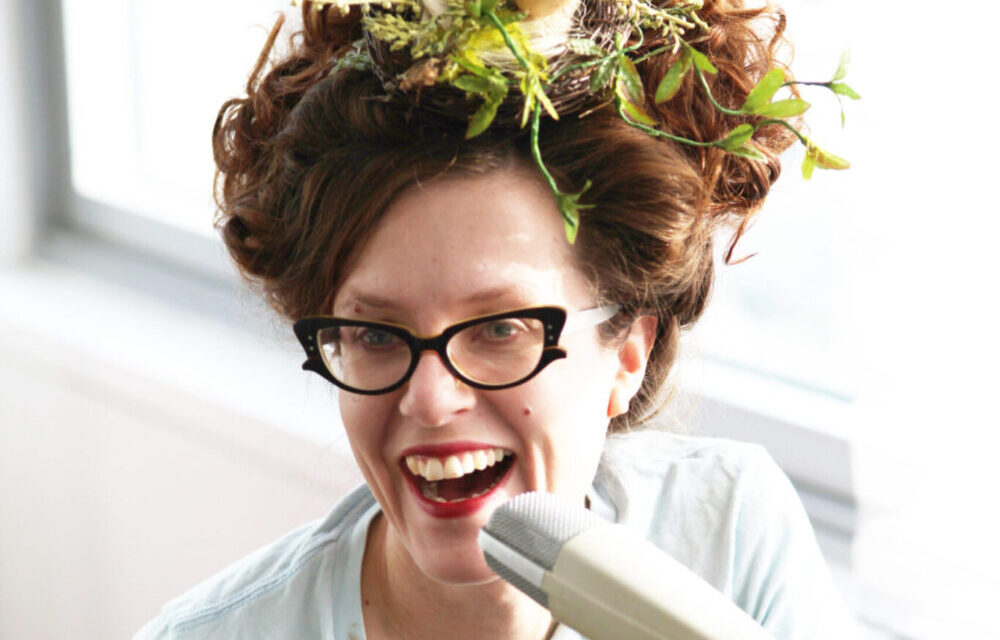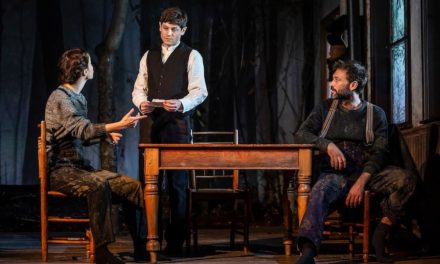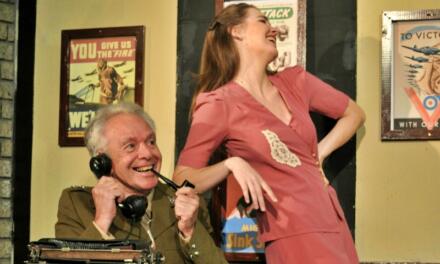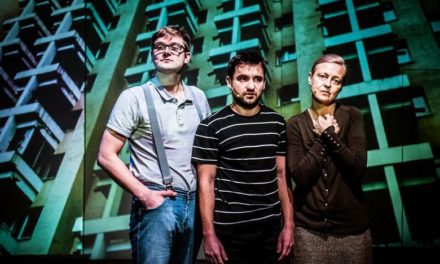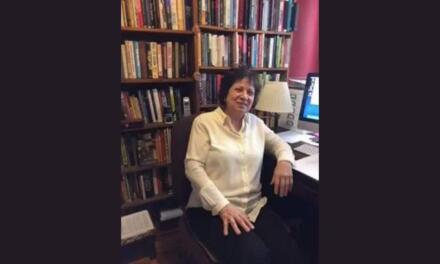Every month, Etcetera gazes into the soul of a performing artist. We choose artistic interest over human interest. This time, we are happy to give the word to Kelly Copper (1971). Together with Pavol Liska, she founded the collective Nature Theater of Oklahoma in 2004. Using readymade material, found space, gifted properties, cosmic accident, extreme formal manipulation, and plain hard work, Nature Theater of Oklahoma makes art to affect a shift in the perception of everyday reality that extends beyond the site of performance and into the world in which we live.
Etcetera: What was your first experience with the performing arts?
Kelly Copper: I grew up as a kid surrounded by adults who were all very – to be kind, I will just say “colorful.” A desultory mix of boozers and weirdos and outsiders who all worked with my father. He was a radio personality, and had his own morning show at various stations across the country during my childhood, and we floated with him from job to job. It was not a very normal childhood or a very stable one. He wasn’t like the other dads. He went to “work” everyday with his bag of toys – slide whistles, kazoos, this tin can thing that made a cow sound. We were not allowed to touch these items. When I was little, I didn’t understand where he went, how it all worked. I assumed he had to get himself inside the radio — imagined that he shrunk himself or something. Radio attracted a whole cast of strange characters back then. Some made money on the side doing cartoon voices. One guy was a magician… My dad would sometimes take my sister and I on the weekend to the station to give my mother a break from caring for us, and we would be locked in this booth where they recorded commercials while he did his show. He’d leave us there with a small black and white TV and a box of cracker jacks and whoever was there at the station would come check on us, entertain us, just hang out. These adults, all of which had a connection to performance, probably were my first taste of the performing arts, and also my unwitting first audience.
What did you want to become as a child?
I wanted to be an artist of some kind, even as a kid. I loved painting, making audio recordings, writing. I made costumes for myself out of paper. I made cardboard fish and hung them from the ceiling and pretended I lived underwater. Or for a while I guess I thought I might be an inventor as well. I liked to mix things together and see what happened. I made a really nice insect trap once out of dog feces and sugar with my sister. We noticed that bugs really like those two things, and so we built this thing to see how many we could attract. Those were the days. Now kids just play with computers. For us, it was shit and sugar…
Which performance kept you awake at night recently?
I haven’t seen too many performances recently. Like most people in NY. The pandemic really killed everything here entirely for the past couple of years. And travel was also not possible. So, I would say the last public gathering that last kept me awake were the Black Lives Matter protests in New York. That was the first time I had been in a crowd of people in a very long time, and the experience of that was very powerful. People came with their dogs, their kids, their home-made signs. Was the most inspiring event in recent memory.
And which performance is unforgettable?
Reza Abdoh’s Quotations from a Ruined City/Wooster Group: Frank Dell’s The Temptation of St. Anthony
What is your favorite place to be?
I usually am in cities, but I do love to be out in nature more than anything. Lately, I have been visiting a sanctuary for birds of prey in upstate New York. Pavol and I went on a walk with two Harris Hawks into the woods. It was just us and the birds. They have little bells on their talons and you can hear them as they go from tree to tree. This is amazing. When you call the birds back to the glove and they fly to you and rest on your arm…It’s the closest thing to heaven. I would love to have another life where I can live far away and learn to know a wild creature like this, to live in a wild place and have a radically different experience of time and space.
Where would you like to show your work once?
I would love once to show work outdoors, in some vast landscape. I don’t know where exactly. But I read about a remote place in Greece, located in the hills of the Peloponnese, which is where the experimental filmmaker Gregory Markopoulos has had screenings of his work. In the late 1960s, he withdrew all his films from distribution, and was preoccupied with editing all his life’s work into one giant film cycle – 80 hours long – which he wanted to be shown only in this place, which he called the Temenos; in Greek, it means land assigned to the gods. He never lived to see it, but I know they have done a few screenings there since his death, and I have for a long while wanted to go, to visit the site and experience one of those screenings myself to see how it feels – a group of people coming together to a desolate place to experience an entire body of work, with nothing else around for miles. No other purpose. I really love the epic ambition of that. It reminds me of a religious pilgrimage. I don’t know exactly where my space would be in the world, but I would love to have a remote place outside of the audience’s daily lives, where you make a concerted effort to leave all that behind and come together and share something special.
Who taught you the most in your life?
I would say my cats have taught me the most. About being present, alive, loving, and attentive to small things. Also I have learned a lot over the years from Pavol, my partner. More than I can elaborate here.
What does your workplace or atelier look like?
We work mainly in our apartment and have for years. This is where we write and also rehearse. It’s a big open room (it used to be a very, very small room!), with a mix of personal and work things. Right now on the sofa there are two hammerhead shark costumes from the last show which we didn’t end up using, but they still keep us company: the shark’s names are Rusty and Jazz. There’s a big table with my computer, an oil lamp, and a box of Kleenex. A big rug in the middle of the room, which I originally got for our cat, Miles, who suffered a lot walking on the hard wood floor with his arthritis, but it’s now been through a lot of rehearsals, and has the sweat of everyone who has ever danced on it. It’s home in every way, every possible meaning.
Do you have a ritual before you go on stage or before a premiere?
Yes, usually all of us march around on stage and sing an old cowboy song, Home in Oklahoma. Before every performance. We cover the whole stage and greet each other as we pass, make each other laugh. Somehow this makes the space ours and is a way we all know we have each other’s back. Pavol and I as well as the actors. Sometimes even the technicians join in from the back of the house. Everyone knows the words.
What is the best thing about your job?
I don’t think of it as a job. I can’t – the moment it becomes a job, I’m quitting!
No, but the best thing about it is it’s never the same thing twice. I always have something new to learn. I always have the sense of being a beginner, and not knowing what I’m doing. That is the best. And also sometimes the worst.
Do your parents like your work?
My parents and Pavol’s, as well, have never really seen the work. Pavol’s are in Slovakia and don’t speak English, have no connection to theater. My mother was very sick for most of the past 15 years, and wasn’t able to travel, so she never got to see it, either. She was a big lover of theater, though. She used to do community theater when I was a kid, and she liked to sing. And I honestly do think about her a lot. Her taste was never for the avant-garde or experimental. So, I always think no matter how experimental we get – or whatever crazy shit I am interested in – I always want there to be a door there for her. Or for anyone, really. You should be able to come and experience the work and enjoy something about it even if you maybe don’t care at all what we’re doing formally. We’re always thinking about where’s the pleasure for the audience and for ourselves – along with anything else we might be personally or aesthetically preoccupied with.
Does theatre have an impact?
It has had impact on me. I’ve experienced performances which have changed my life, so I can say yes from experience. I don’t think you can impact a crowd of people, influence the masses or anything – but if you can impact one person, that’s a good night.
With whom would you like to collaborate once? Are there certain artists you feel related to?
I already collaborate with Pavol and this is a lot! And, of course, the people we work with. Maybe Liz LeCompte and the Wooster Group? We’re very different sensibilities, but I have always found their work inspiring. I know Liz has a sense of humor and an appreciation for the American low culture and show biz as well as being very deeply experimental. I would be curious to work with her.
Most of the artists I feel related to are all dead. Marcel Duchamp, John Cage, Jack Smith, Mike Kelly, Reza Abdoh…
Who would you like to see collaborate on a piece?
I don’t know. I’m gonna go with Bill Forsythe and Disney Carnival Cruises.
Did you ever have a special encounter with an audience member?
When we did No Dice in Seattle, there was one evening where someone in the audience thought the person in the seat next to them was dead. It turned out he had just fallen very deeply asleep. But we had to stop the show, and they called an ambulance…that was special.
What is the most recent note you made?
“Buy apples.”
No, if you’re talking about a work note – my last note was “Maybe put this earlier so the audience thinks they might get a break…”
Is art your life?
It is. Maybe people with children, they have another life which is separate from their creative life, but my personal life from the beginning has been a part of whatever I’m into making. Pavol and I have been together for over 30 years, and I can’t remember a vacation or a time out. Even when we went somewhere, even to visit my family, his family, we would take a tape recorder and record everything. It was always creative time.
If you had the chance to start again and choose a new career, what would you do?
I would love to work on a farm somewhere with animals — something where you can get dirty, smell and feel and be close to elemental life. It would be great, I think, to work hard at a job where it’s visible, at the end of the day, just what you have done. You can look and see: I have dug this hole, I have plowed this field, I have fed these animals. So much of what we do in art is unfinished or intangible. At the end of a day’s work here all I have left to show is a bag of sweaty costumes.
Do you think the theatre will survive in the future?
Yes. As humans we absolutely fundamentally need to see and be seen and transform our own experience, search for meaning. Whatever form this takes – you can call it theater – certainly it will continue.
This article was originally posted on E-tcetera on January 2, 2022, and has been reposted with permission. To read the original article, click here.
This post was written by the author in their personal capacity.The opinions expressed in this article are the author’s own and do not reflect the view of The Theatre Times, their staff or collaborators.
This post was written by Etcetera .
The views expressed here belong to the author and do not necessarily reflect our views and opinions.

